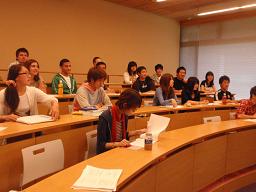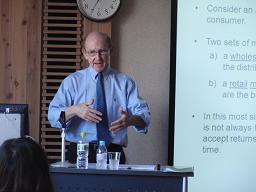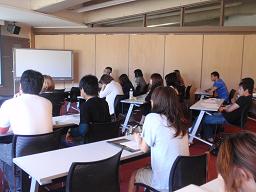Prof. Comanor's Lectures at AIU: コマナー教授の特別講演@国際教養大学 [Report]
Prof. Comanor's Lectures at AIU: コマナー教授の特別講演@国際教養大学
Speaker: スピーカー:
Prof. William Comanor (University of California, Los Angeles & Santa Barbara)
ウィリアム・コマナー教授(カリフォルニア大学ロサンゼルス校・サンタバーバラ校)
Special Lectures: 特別講演:
Lecture 1 (Sept. 16) "Economics of Organ Transplantation; Case of Kidneys"
講演1 (9月16日)「臓器移植の経済学:腎臓のケース」


Lecture 2 (Sept. 17) "Resale Price Maintenance: Case of Publishing in Japan"
講演2 (9月17日)「再販制度:日本の出版業界のケース」


The following is an English summary to be followed by a Japanese summary:
以下は英語の要旨(さらにその下に日本語の要旨掲載):
(English summary):
Professor William S. Comanor (University of California, Los Angeles and Santa Barbara) officially visited Akita International University to gave special lectures on September 16(Th) and 17(F). His lectures were intended not only for the students enrolled in Prof. Miyao’s economics courses, but also for a wider audience on campus, including faculty members.
Lecture 1:
On September 16(Th), 15:30-16:45, Prof. Comanor delivered his lecture in ECN328/338 (Intermediate Microeconomics), entitled, “Economics of Organ Transplantation: Case of Kidneys” in Room D104 with more than 30 participants including several faculty members in Global Business.
After Prof. Miyao’s brief introductory remark, Prof. Comanor gave a talk on the economic analysis of kidney transplantation. The following is a summary of his lecture:
In the U.S., where the market transaction of kidneys is prohibited, the operation cost of a kidney transplant is $160,000 (about 14,000,000 yen), at which demand exceeds supply, and the difference is the size of waiting list. It is estimated by some economists that paying donors $15,200 (about 1,300,000 yen) per donation is sufficient to generate a large additional supply, which means that supply should meet demand at $175,200 = $160,000 + $15,200 (about 15,300,000 yen = 14,000,000 yen + 1,300,000 yen) per transplant.
But there is a major problem with compensating donors: most donors would be poor and more recipients would be rich, violating the principle of equity. A possible solution is to pay each donor about $94,000 (8,000,000 yen), which is the amount of medical care expenses to be saved by a kidney transplant. This way, the donors would receive relatively high prices for their kidneys, whereas the recipients would gain major health benefits without increasing the overall health care costs for the economy.
For a more detailed summary, see the following course blog:
http://microecon.blog.com/2010/09/13/special-lecture-economics-of-organ-transplantation-case-of-kidneys/
Prof. Comanor did a good job in encouraging questions and discussions, so during and after the lecture, there were many questions asked by participants, such as why the market transaction of human organs is prohibited in the U.S., Japan and some other countries, who gain, who lose, etc. It was a good topic to discuss, as the organ transplant law has recently been revised in Japan.
Lecture 2:
On September 17(F), 10:30-11:45, Prof. Comanor gave his lecture in ECN322 (Economics of Globalization), entitled, “Antitrust Policy towards Resale Price Maintenance: Case of Publishing in Japan” in Room D101 with about 40 participants including a couple of faculty members in Global Business. The following is a summary of his lecture:
In the case of markets with manufacturers, distributors and consumers, RPM (resale price maintenance) is sometimes adopted, that is, resale prices are maintained above a certain level imposed by the manufacturer, or possibly instigated by large distributors (forcing the manufacturer to impose RPM on their small rival distributors). In the former case, i.e., the case of manufacturer imposed RPM, economic efficiency may be improved, whereas consumers are harmed and economic efficiency is reduced in the latter case, i.e., the case of large distributor instigated RPM.
From this analysis, it is argued that in the case of publishing in Japan, there seems to be a major difference between books, where the leading two wholesalers play a major role, and newspapers, where the large publishers are the dominant firms. Consumer harm and anti-competitive results from RPM are far more likely for books than for newspapers.
For a more detailed summary, see the following course blog:
http://glob.blog.com/2010/09/13/special-lecture-antitrust-policy-towards-resale-price-maintenance-case-of-publishing-in-japan/
During the lecture, a lively discussion took place about whether we benefit or lose from a large number of bookstores supported by RPM, as observed in Japan. Some participants argued for a large number of “community” bookstores offering personal services even with relatively high prices, whereas others said they would prefer low prices even with no personal services. Prof. Comanor suggested that it would be best to have these two kinds of bookstores at the same time so that the consumer can choose between them. Finally, a question was raised about the monopoly power of a small number of newspaper publishers in Japan. Although the economic analysis was rather difficult to understand, the subject matter was interesting enough to generate questions and discussions among the participants.
Prof. Comanor’s special lectures offered a unique opportunity for the students and other participants to learn how economic analysis can be applied to important real-world issues and how class discussions should be conducted effectively to deepen the students’ understanding of the subject matter. We need more visitors to give this kind of special lectures at AIU for the sake of students and faculty members as well.
(日本語要旨)
9月16日(木)と17日(金)に、ウィリアム・コマナー教授(カリフォルニア大学ロサンゼルス校・サンタバーバラ校)が国際教養大学を訪問して特別講演を行った。講演は宮尾教授の経済のクラス(グローバルビジネス)で行われたが、履修学生に加えてファカルティメンバーも含め広く大学のメンバー全体をターゲットとするものであった。
講演1:
9月16日(木)15:30-16:45のECN328/338 (Intermediate Microeconomics) のクラス(教室D104)では、コマナー教授が「臓器移植の経済学:腎臓移植のケース」というタイトルで講演を行い、30人以上の参加者があり、グローバルビジネスのファカルティメンバーも何人か参加した。
最初に宮尾教授による簡単な紹介と挨拶の後、コマナー教授が臓器移植の経済分析に関する講義を行った。以下がその講演の要旨:
米国では腎臓の市場取引は禁止されているが、病院で腎臓移植を行うコストは16万ドル(約1400万円)ほどで、その値段で需要が供給を上回っており、その差は移植を待っている人の数に他ならない。もし腎臓のドナーに1万5200ドル(約130万円)支払えば多くの腎臓が提供されると推計されているので、合計で17万5200ドル(約1530万円)のコストで需要を満たす供給を確保できることになる。
しかし、そのようにドナーに支払いをすることの問題は、もっぱら低所得者層がドナーとなり、比較的高所得層が移植を受ける人になることであり、これは公正性の原理に抵触する。この問題を解決する一つの方法は、腎臓移植によって健康保険制度全体で節約できるコストの額、約9万4千ドル(約800万円)をドナーに支払うことである。そうすれば、健康保険制度全体としてコストを増加させることなく、ドナーは提供する腎臓に対して比較的高い価格を受ける一方で、移植を受ける人はより健康になるという多大の社会的便益が生じるであろう。
より詳しい要旨(英文)は、以下のコース・ブログの記事を参照:
http://microecon.blog.com/2010/09/13/special-lecture-economics-of-organ-transplantation-case-of-kidneys/
コマナー教授は参加者から質問や議論を引き出すことに長けており、講義の途中およびその後で多くの質問が出された。例えば、なぜ米国や日本やその他の国で、臓器の市場取引が禁止されているのか、取引の禁止で誰が利益を得ているのか、誰が損をしているのかといった質問であった。日本では臓器移植法が最近改正されたこともあり、このような点は十分議論するに値する問題であるといえよう。
講演2:
9月17日(金)10:30-11:45の ECN322 (Economics of Globalization) のクラス(教室D101)では、コマナー教授が「独禁法と再販制度:日本の出版業界のケース」という題名で講演を行い、40人ほどの参加があり、グローバルビジネスのファカルティメンバーも数人出席した。以下がその講演の要旨:
メーカー、流通業者、消費者という構造をもった市場で、再販制度が採用されることがあり、そこでは消費者向けの小売価格がある水準以上に維持される。そのような再販制度は、メーカーによって採用されるが、大規模の流通業者が主導することもある(メーカーを通じて中小流通業者の競争を排除することが目的)。前者のメーカー主導の場合は、市場での経済効率を高める可能性があるが、後者の大規模流通業者主導の場合は、消費者は損を被り、経済効率も損なわれる。
この分析結果を日本の出版業界に応用すると、大規模な卸売業者の主導で再販制度が実施されている書籍の市場では、社会的なマイナスが大きいのに対して、再販制度が新聞社によって主導される新聞の市場では、それほどマイナスが大きくない可能性が高いという結論が得られる。
より詳細な要旨(英文)は、以下のコース・ブログの記事を参照::
http://glob.blog.com/2010/09/13/special-lecture-antitrust-policy-towards-resale-price-maintenance-case-of-publishing-in-japan/
この講演では講義の途中で活発な議論が展開され、日本で見られるように再販制度によって書店が多く維持されている状態が望ましいかどうかについて質疑応答が行われた。ある学生は、たとえ書籍の価格が多少高くても、多くの書店があって、それぞれの地域の住民にきめ細かいサービスが提供される状態が望ましいと主張したのに対して、他の学生は、そのようなサービスは不要で、それよりも書籍の価格が安いことが何よりと主張した。コマナー教授としては、その両方の種類の書店が共存して、消費者が好みに応じてどちらかを選べる状態がベストと結論付けた。最後に、日本の新聞社の独占力についての疑問などが提起された。コマナー教授の経済分析はかなり理解するのが難しいものであったが、テーマそのものは大変興味深かったので、参加者の間で多くの質問や議論が出された。
結論として、コマナー教授の2つの特別講演は、学生を始め参加者たちに、経済分析を現実の重要な問題にどう応用して、クラスでの議論により問題の理解をどう深めるかについて得難い経験とヒントを与えてくれるものであった。国際教養大学としては、学生のためにもファカルティメンバーのためにも、このような有益な講演を行う訪問者を増やすことが望まれるであろう。
以上
---------------------------------------------------------------------------
Speaker: スピーカー:
Prof. William Comanor (University of California, Los Angeles & Santa Barbara)
ウィリアム・コマナー教授(カリフォルニア大学ロサンゼルス校・サンタバーバラ校)
Special Lectures: 特別講演:
Lecture 1 (Sept. 16) "Economics of Organ Transplantation; Case of Kidneys"
講演1 (9月16日)「臓器移植の経済学:腎臓のケース」


Lecture 2 (Sept. 17) "Resale Price Maintenance: Case of Publishing in Japan"
講演2 (9月17日)「再販制度:日本の出版業界のケース」


The following is an English summary to be followed by a Japanese summary:
以下は英語の要旨(さらにその下に日本語の要旨掲載):
(English summary):
Professor William S. Comanor (University of California, Los Angeles and Santa Barbara) officially visited Akita International University to gave special lectures on September 16(Th) and 17(F). His lectures were intended not only for the students enrolled in Prof. Miyao’s economics courses, but also for a wider audience on campus, including faculty members.
Lecture 1:
On September 16(Th), 15:30-16:45, Prof. Comanor delivered his lecture in ECN328/338 (Intermediate Microeconomics), entitled, “Economics of Organ Transplantation: Case of Kidneys” in Room D104 with more than 30 participants including several faculty members in Global Business.
After Prof. Miyao’s brief introductory remark, Prof. Comanor gave a talk on the economic analysis of kidney transplantation. The following is a summary of his lecture:
In the U.S., where the market transaction of kidneys is prohibited, the operation cost of a kidney transplant is $160,000 (about 14,000,000 yen), at which demand exceeds supply, and the difference is the size of waiting list. It is estimated by some economists that paying donors $15,200 (about 1,300,000 yen) per donation is sufficient to generate a large additional supply, which means that supply should meet demand at $175,200 = $160,000 + $15,200 (about 15,300,000 yen = 14,000,000 yen + 1,300,000 yen) per transplant.
But there is a major problem with compensating donors: most donors would be poor and more recipients would be rich, violating the principle of equity. A possible solution is to pay each donor about $94,000 (8,000,000 yen), which is the amount of medical care expenses to be saved by a kidney transplant. This way, the donors would receive relatively high prices for their kidneys, whereas the recipients would gain major health benefits without increasing the overall health care costs for the economy.
For a more detailed summary, see the following course blog:
http://microecon.blog.com/2010/09/13/special-lecture-economics-of-organ-transplantation-case-of-kidneys/
Prof. Comanor did a good job in encouraging questions and discussions, so during and after the lecture, there were many questions asked by participants, such as why the market transaction of human organs is prohibited in the U.S., Japan and some other countries, who gain, who lose, etc. It was a good topic to discuss, as the organ transplant law has recently been revised in Japan.
Lecture 2:
On September 17(F), 10:30-11:45, Prof. Comanor gave his lecture in ECN322 (Economics of Globalization), entitled, “Antitrust Policy towards Resale Price Maintenance: Case of Publishing in Japan” in Room D101 with about 40 participants including a couple of faculty members in Global Business. The following is a summary of his lecture:
In the case of markets with manufacturers, distributors and consumers, RPM (resale price maintenance) is sometimes adopted, that is, resale prices are maintained above a certain level imposed by the manufacturer, or possibly instigated by large distributors (forcing the manufacturer to impose RPM on their small rival distributors). In the former case, i.e., the case of manufacturer imposed RPM, economic efficiency may be improved, whereas consumers are harmed and economic efficiency is reduced in the latter case, i.e., the case of large distributor instigated RPM.
From this analysis, it is argued that in the case of publishing in Japan, there seems to be a major difference between books, where the leading two wholesalers play a major role, and newspapers, where the large publishers are the dominant firms. Consumer harm and anti-competitive results from RPM are far more likely for books than for newspapers.
For a more detailed summary, see the following course blog:
http://glob.blog.com/2010/09/13/special-lecture-antitrust-policy-towards-resale-price-maintenance-case-of-publishing-in-japan/
During the lecture, a lively discussion took place about whether we benefit or lose from a large number of bookstores supported by RPM, as observed in Japan. Some participants argued for a large number of “community” bookstores offering personal services even with relatively high prices, whereas others said they would prefer low prices even with no personal services. Prof. Comanor suggested that it would be best to have these two kinds of bookstores at the same time so that the consumer can choose between them. Finally, a question was raised about the monopoly power of a small number of newspaper publishers in Japan. Although the economic analysis was rather difficult to understand, the subject matter was interesting enough to generate questions and discussions among the participants.
Prof. Comanor’s special lectures offered a unique opportunity for the students and other participants to learn how economic analysis can be applied to important real-world issues and how class discussions should be conducted effectively to deepen the students’ understanding of the subject matter. We need more visitors to give this kind of special lectures at AIU for the sake of students and faculty members as well.
(日本語要旨)
9月16日(木)と17日(金)に、ウィリアム・コマナー教授(カリフォルニア大学ロサンゼルス校・サンタバーバラ校)が国際教養大学を訪問して特別講演を行った。講演は宮尾教授の経済のクラス(グローバルビジネス)で行われたが、履修学生に加えてファカルティメンバーも含め広く大学のメンバー全体をターゲットとするものであった。
講演1:
9月16日(木)15:30-16:45のECN328/338 (Intermediate Microeconomics) のクラス(教室D104)では、コマナー教授が「臓器移植の経済学:腎臓移植のケース」というタイトルで講演を行い、30人以上の参加者があり、グローバルビジネスのファカルティメンバーも何人か参加した。
最初に宮尾教授による簡単な紹介と挨拶の後、コマナー教授が臓器移植の経済分析に関する講義を行った。以下がその講演の要旨:
米国では腎臓の市場取引は禁止されているが、病院で腎臓移植を行うコストは16万ドル(約1400万円)ほどで、その値段で需要が供給を上回っており、その差は移植を待っている人の数に他ならない。もし腎臓のドナーに1万5200ドル(約130万円)支払えば多くの腎臓が提供されると推計されているので、合計で17万5200ドル(約1530万円)のコストで需要を満たす供給を確保できることになる。
しかし、そのようにドナーに支払いをすることの問題は、もっぱら低所得者層がドナーとなり、比較的高所得層が移植を受ける人になることであり、これは公正性の原理に抵触する。この問題を解決する一つの方法は、腎臓移植によって健康保険制度全体で節約できるコストの額、約9万4千ドル(約800万円)をドナーに支払うことである。そうすれば、健康保険制度全体としてコストを増加させることなく、ドナーは提供する腎臓に対して比較的高い価格を受ける一方で、移植を受ける人はより健康になるという多大の社会的便益が生じるであろう。
より詳しい要旨(英文)は、以下のコース・ブログの記事を参照:
http://microecon.blog.com/2010/09/13/special-lecture-economics-of-organ-transplantation-case-of-kidneys/
コマナー教授は参加者から質問や議論を引き出すことに長けており、講義の途中およびその後で多くの質問が出された。例えば、なぜ米国や日本やその他の国で、臓器の市場取引が禁止されているのか、取引の禁止で誰が利益を得ているのか、誰が損をしているのかといった質問であった。日本では臓器移植法が最近改正されたこともあり、このような点は十分議論するに値する問題であるといえよう。
講演2:
9月17日(金)10:30-11:45の ECN322 (Economics of Globalization) のクラス(教室D101)では、コマナー教授が「独禁法と再販制度:日本の出版業界のケース」という題名で講演を行い、40人ほどの参加があり、グローバルビジネスのファカルティメンバーも数人出席した。以下がその講演の要旨:
メーカー、流通業者、消費者という構造をもった市場で、再販制度が採用されることがあり、そこでは消費者向けの小売価格がある水準以上に維持される。そのような再販制度は、メーカーによって採用されるが、大規模の流通業者が主導することもある(メーカーを通じて中小流通業者の競争を排除することが目的)。前者のメーカー主導の場合は、市場での経済効率を高める可能性があるが、後者の大規模流通業者主導の場合は、消費者は損を被り、経済効率も損なわれる。
この分析結果を日本の出版業界に応用すると、大規模な卸売業者の主導で再販制度が実施されている書籍の市場では、社会的なマイナスが大きいのに対して、再販制度が新聞社によって主導される新聞の市場では、それほどマイナスが大きくない可能性が高いという結論が得られる。
より詳細な要旨(英文)は、以下のコース・ブログの記事を参照::
http://glob.blog.com/2010/09/13/special-lecture-antitrust-policy-towards-resale-price-maintenance-case-of-publishing-in-japan/
この講演では講義の途中で活発な議論が展開され、日本で見られるように再販制度によって書店が多く維持されている状態が望ましいかどうかについて質疑応答が行われた。ある学生は、たとえ書籍の価格が多少高くても、多くの書店があって、それぞれの地域の住民にきめ細かいサービスが提供される状態が望ましいと主張したのに対して、他の学生は、そのようなサービスは不要で、それよりも書籍の価格が安いことが何よりと主張した。コマナー教授としては、その両方の種類の書店が共存して、消費者が好みに応じてどちらかを選べる状態がベストと結論付けた。最後に、日本の新聞社の独占力についての疑問などが提起された。コマナー教授の経済分析はかなり理解するのが難しいものであったが、テーマそのものは大変興味深かったので、参加者の間で多くの質問や議論が出された。
結論として、コマナー教授の2つの特別講演は、学生を始め参加者たちに、経済分析を現実の重要な問題にどう応用して、クラスでの議論により問題の理解をどう深めるかについて得難い経験とヒントを与えてくれるものであった。国際教養大学としては、学生のためにもファカルティメンバーのためにも、このような有益な講演を行う訪問者を増やすことが望まれるであろう。
以上
---------------------------------------------------------------------------
2010-09-20 22:01
コメント(0)
トラックバック(0)




コメント 0
コメントの受付は締め切りました